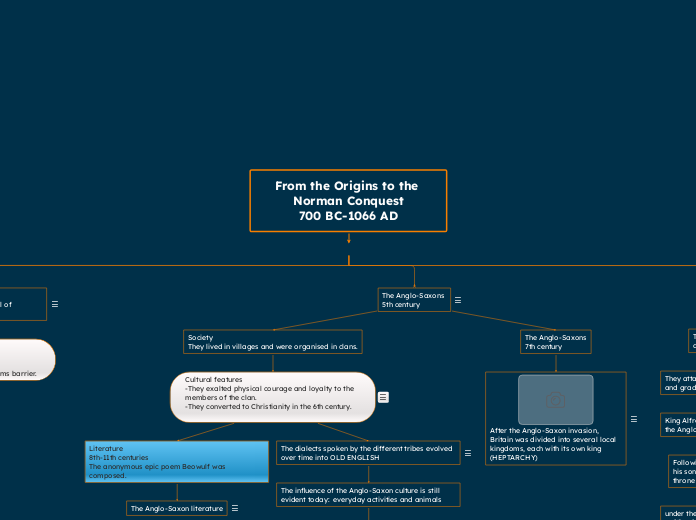From the Origins to the Norman Conquest
700 BC-1066 AD
THE CELTS
700 BC-43 AD
Society
- They were organised into clans.
- They were skilled at iron-working.
- They practised agriculture.
Cultural features
- They built hill forts.
-They worshipped nature; their priest were the Druids.
They spoke their own language
The Romans
43 (Emperor Claudius)-409 (withdrawal of soldiers)
Cultural features
They built
-towns, baths and roads
-Hadrian's Wall, a defence and customs barrier.
The Anglo-Saxons
5th century
Society
They lived in villages and were organised in clans.
Cultural features
-They exalted physical courage and loyalty to the members of the clan.
-They converted to Christianity in the 6th century.
Literature
8th-11th centuries
The anonymous epic poem Beowulf was composed.
The Anglo-Saxon literature
The dialects spoken by the different tribes evolved over time into OLD ENGLISH
The influence of the Anglo-Saxon culture is still evident today: everyday activities and animals
The Ecclesiastical History of the English People, written by the monk Venerable Bede
(ca 673–735). He was the first to use the word ‘Angle-Land’ (the root name for
England).
The Anglo-Saxons 7th century

After the Anglo-Saxon invasion, Britain was divided into several local kingdoms, each with its own king (HEPTARCHY)
The Vikings
8th-9th centuries
They came from Norway, Sweden and Denmark.
They attacked the monastery of Lindisfarne in 793 and gradually settled in the country.
King Alfred the Great of Wessex (871–899) united the Anglo-Saxons against the Vikings.
Following the death of Alfred the Great in 899, his son Edward the Elder ascended to the throne of Wessex.
under the reign of his son, Athelstan, the unification of England truly took shape.
The Normans
1066 -
William the Conqueror introduced the FEUDAL SYSTEM into England
Clash between The Crown and the Church
Herny II (1154-89) wanted to control the Church and order the assassination of the Archbishop of Canterbury, Thomas Becket
Richard I (1189-99) joined the Crusade and fought against the French king, Philip II
